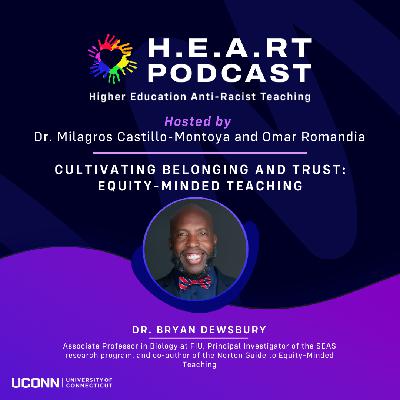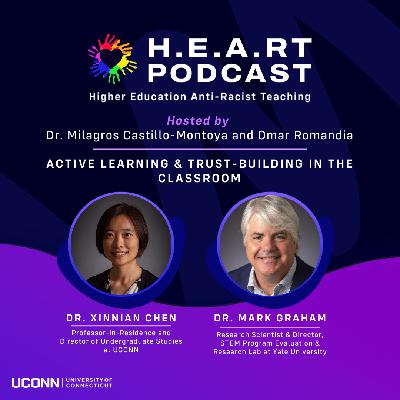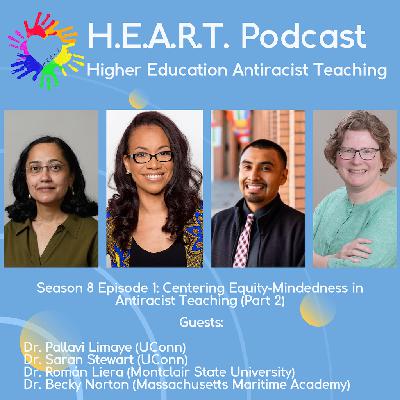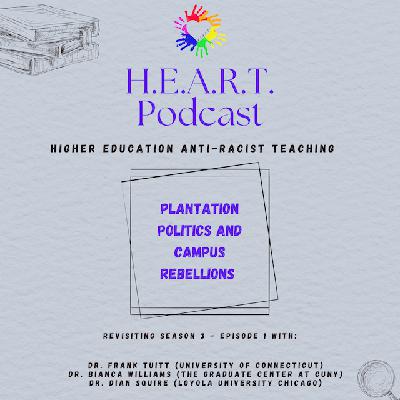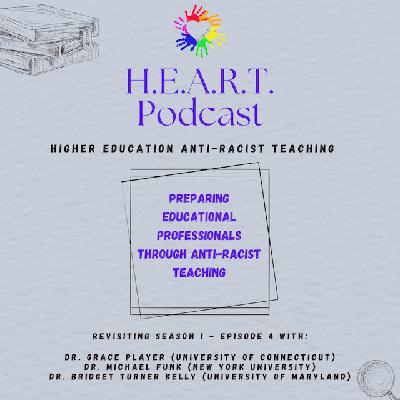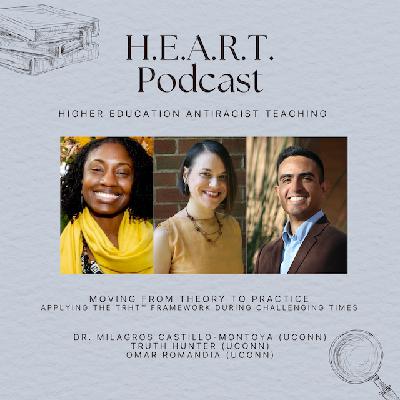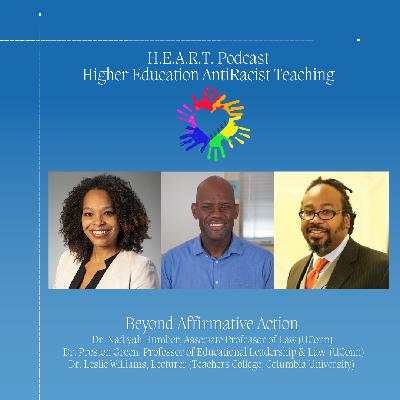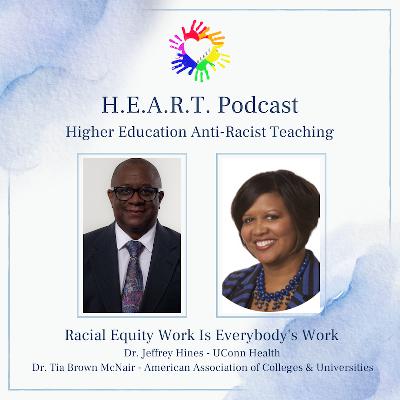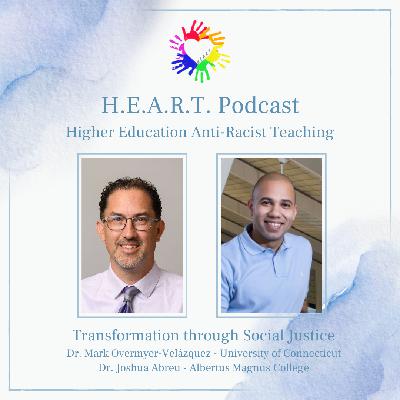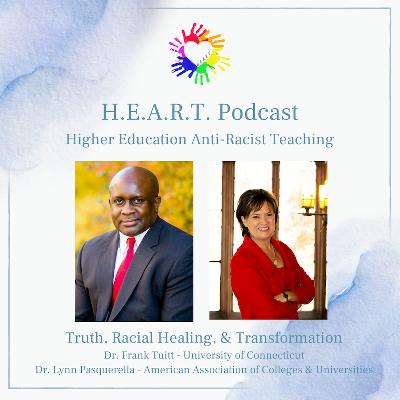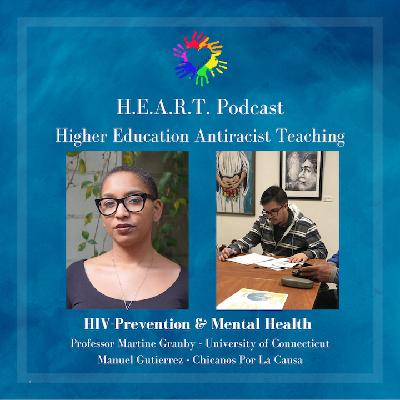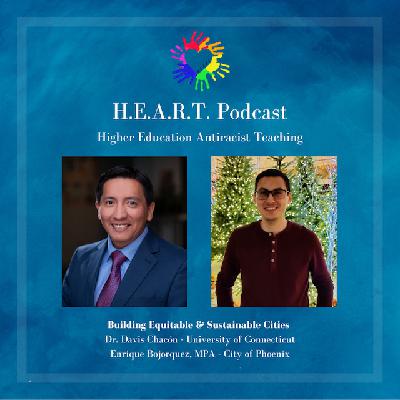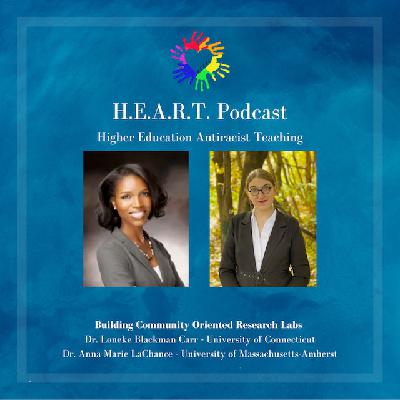Discover Higher Education Anti-Racist Teaching (H.E.A.R.T.) Podcast
Higher Education Anti-Racist Teaching (H.E.A.R.T.) Podcast

Higher Education Anti-Racist Teaching (H.E.A.R.T.) Podcast
Author: The Office for Diversity and Inclusion at the University of Connecticut
Subscribed: 10Played: 53Subscribe
Share
© Copyright 2021 All rights reserved.
Description
The Higher Education Anti-Racist Teaching (H.E.A.R.T.) Podcast focuses on elevating our learning about antiracist teaching at colleges and universities.
In this podcast, we explore what antiracist teaching in higher education is, what it entails, what challenges educators face, and any advice our guests can give our audience in their antiracist teaching journey.
The podcast is co-hosted by Dr. Milagros Castillo-Montoya, and doctoral students Omar Romandia and Truth Hunter. With a strong commitment to centering the learning of BIPOC students, they ask questions of their guests to deepen conceptions about antiracist teaching as well as advance teaching practices that align with antiracist tenets.
The podcast is supported by the Office for Diversity and Inclusion and the Center for Excellence in Teaching and Learning at the University of Connecticut.
In this podcast, we explore what antiracist teaching in higher education is, what it entails, what challenges educators face, and any advice our guests can give our audience in their antiracist teaching journey.
The podcast is co-hosted by Dr. Milagros Castillo-Montoya, and doctoral students Omar Romandia and Truth Hunter. With a strong commitment to centering the learning of BIPOC students, they ask questions of their guests to deepen conceptions about antiracist teaching as well as advance teaching practices that align with antiracist tenets.
The podcast is supported by the Office for Diversity and Inclusion and the Center for Excellence in Teaching and Learning at the University of Connecticut.
42 Episodes
Reverse
In this episode of the H.E.A.R.T. Podcast, Dr. Bryan Dewsbury joins Dr. Milagros Castillo-Montoya and Omar Romandia to explore the critical role of trust and belonging in equity-minded teaching. Drawing from his co-authored book, The Norton Guide to Equity-Minded Teaching, Dr. Dewsbury shares practical strategies for moving beyond transactional teaching models to create humanizing and inclusive learning environments.
He challenges the “tyranny of coverage” in curriculum design, advocating for a shift from rote memorization to critical thinking, dialogue, and skills development. This conversation offers actionable insights to help educators build trust, foster belonging, and create classroom spaces where all students can thrive.
Join us for this thought-provoking discussion on transforming teaching practices to support meaningful student engagement.
In this episode of the H.E.A.R.T. Podcast, Dr. Xinnian Chen and Dr. Mark Graham discuss the importance of trust in student engagement and buy-in, particularly for STEM education. They highlight the transformative power of human connection in fostering meaningful learning outcomes and discuss the critical role of non-cognitive aspects of learning in classroom success.
Dr. Chen shares her journey in integrating active learning while addressing the “content monster” and emphasizes the lasting impact of human connections in the classroom.
Dr. Graham reflects on his work with high-achieving students and how those experiences shaped his approach to trust-building and engagement for undergraduate STEM education.
This conversation provides educators with actionable strategies to create inclusive, supportive environments that enhance student learning and well-being.
Join us for this inspiring dialogue about the transformative power of trust in education.
In this episode, we continue our conversation on equity-mindedness and how it can advance antiracist and equitable teaching in the classroom. Our guests Dr. Pallavi Limaye, Assistant Professor in Residence at the Department of Molecular and Cell Biology at the University of Connecticut, Dr. Saran Stewart, Director of Academic Affairs and Associate Professor of Higher Education and Student Affairs at the University of Connecticut, Dr. Román Liera, Assistant Professor in the Department of Educational Leadership at Montclair State University, and Dr. Becky Norton, Professor in the Science & Mathematics Department at Massachusetts Maritime Academy, share their perspectives on how equity-minded inquiry that can lead to changing teaching practices. We delve into the reality that, just as students, educators themselves can also constantly learn, take in information, and make necessary changes to improve their teaching and ultimately their students’ learning outcomes. Yet, such efforts require lots of time and an ecosystem of support. We end with advice from our guests about being courageous, self-reflective, and creative in order to make learning more equitable for students.
In this episode, we focus on equity-mindedness and how it can advance antiracist and equitable teaching. Our guests Dr. Pallavi Limaye, Assistant Professor in Residence at the Department of Molecular and Cell Biology at the University of Connecticut, Dr. Saran Stewart, Director of Academic Affairs and Associate Professor of Higher Education and Student Affairs at the University of Connecticut, Dr. Román Liera, Assistant Professor in the Department of Educational Leadership at Montclair State University, and Dr. Becky Norton, Professor in the Science & Mathematics Department at Massachusetts Maritime Academy, share their perspectives on equity-mindedness and how it can inform important inquiry that can then lead to changing teaching practices. We also touch on how to support faculty who want to engage in this type of inquiry and work toward changing their teaching to achieve more equitable outcomes. We landed on the idea that we must get and stay curious in our understanding of data and be courageous to take on necessary changes.
The HEART Podcast team reflects on an episode from our archives originally aired on February 4, 2022 called: Plantation Politics and Campus Rebellions. Our faculty guests, Dr. Bianca Williams and Dr. Dian Squire, discuss the complex nature of antiracist teaching and the emotional work of engaging in this scholarship. They share what antiracist teaching means to them, how it shows up in their classroom, and how they reimagine educational spaces to center BIPOC voices and experiences. We also hear about the ways in which our guests set boundaries when engaging in antiracist work in the academy.
The HEART Podcast team reflects on an episode from our archives originally aired on March 24, 2021 called: Preparing Educational Professionals through Antiracist Teaching. Our faculty guests, Dr. Grace Player, Dr. Bridget Turner Kelly, and Dr. Michael Funk, share how knowledge is constructed and consumed in ways that center the lived experiences of students. This approach to teaching and learning can liberate both faculty and students from limiting paradigms. We also hear about creative ways that faculty cultivate collective learning experiences in order for students to thrive.
For this episode, the HEART Podcast team reflects on an episode from our archives originally aired on June 4, 2021 called: Community Engagement & Anti-Racist Teaching. Our faculty guests, Dr. Danielle Filipiak and Dr. Johnny Ramirez, share the ways that they engage communities outside of the academy and empower youth to be agents of their learning and development. We also hear student perspectives from Marissa Martinez Suarez and Briana Aguilar, who discuss the ways that culturally relevant courses and campus activism have deepened their learning and led them to personal transformation. This episode highlights the power of faculty-student solidarity as it relates to community engagement and anti-racist teaching.
For this episode, the HEART Podcast team reflects on their 2023 focus on the Truth, Racial Healing and Transformation (TRHT)™ framework by selecting excerpts from previous guests who provided insights helpful for thinking about how we can bring more curiosity, humility, and compassion to our teaching when our students are making meaning of what is happening in the world around them. Our discussion underscores the practical application of the TRHT framework such as how to use written reflection, center the wellbeing of students, and empower students with critical thinking tools.
Nadiyah Humber, Associate Professor at UConn School of Law, Dr. Preston Green, Professor of Educational Leadership and Law at UConn, and Dr. Leslie Williams, lecturer of Higher & Postsecondary Education at Teachers College, Columbia University, provide the context for understanding how Affirmative Action fits into a larger history of educational inequality for minoritized students. Our guests discuss how, given our current legal and political climate, there are action steps that higher education institutions can take to remove barriers that disproportionately impact racially minoritized students. With regard to anti-racist teaching, this episode provides faculty with recommendations on how to leverage classroom spaces and use critical theories in their practice. Together these strategies are meant to understand the full context of educational inequality and also drive constructive dialogue to envision more equitable pipelines and support mechanisms for minoritized scholars, staff, and faculty.
Dr. Laura Bunyan, Associate Professor of Residence at UConn and Gracie Guzman, Success Program Manager for Higher Edge, explore the topic of economic challenges that students may experience while in college. They discuss how educators can rethink classroom practices in order to support students who experience food insecurity, work full-time, and take care of their families. The conversation in this episode challenges us to rethink assumptions about financial and life circumstances that hinder students from showing up as their best selves. Instead, we must ask ourselves, “What are the conditions and circumstances that might prevent our students from showing up fully?” Additionally, Gracie and Laura highlight two inspiring initiatives, Husky Harvest and The Success Closet, that alleviate economic challenges and give students the resources they need to thrive.
Josh Brown, Director of ScHOLA2RS House at the University of Connecticut and Latrina Denson, Associate Dean of Students, Community and Belonging at Mount Holyoke College, provide their perspective on the importance of having intentional affirming spaces on college campuses. Together, we explore how cultural centers and identity-based residential living communities are designed to provide minoritized students with spaces and services specifically aimed to meet their needs. Join us to hear more about their unique insights on anti-racist teaching practices that leverage non-white and non-Eurocentric forms of learning to uplift the feelings, ideas, and concerns of minoritized students on college campuses.
Dr. Jeffrey Hines, Chief Diversity Officer at UConn Health and Dr. Tia Brown McNair, Vice President in the Office of Diversity, Equity, and Student Success and Executive Director for the Truth, Racial Healing, and Transformation (TRHT)™ Campus Centers at the American Association of Colleges and Universities (AAC&U) draw on key ideas from the TRHT framework to shed light on how racial equity work is not solely the responsibility of a few, but rather, the responsibility of all community members. We discuss racial disparities in health and education, as major public health concerns that require the active participation of multiple community stakeholders working towards a shared vision of transformation in higher education.
Dr. Mark Overmyer-Velázquez, University Campus Director of UConn-Hartford and Dr. Joshua Abreu, Director of the Center for Teaching & Learning Excellence at Albertus Magnus College, share how they have witnessed and been part of social justice-guided transformational practices, given that it is a central pillar of the Truth, Racial Healing, and Transformation (TRHT)™ framework being advanced by the American Association of Colleges and Universities (AAC&U) and the W.K. Kellogg Foundation. We discuss ways in which institutional transformation can take place to better support students, faculty, staff, and communities.
Michael Vidal, Interim Director of PRLACC & Director of Diversity and Inclusion Initiatives at the University of Connecticut, Sharon Stroye, Director of Public Engagement in the School of Public Affairs and Administration at Rutgers University–Newark, and Dr. Apryl Alexander, Metrolina Distinguished Scholar in Health and Public Policy at UNC Charlotte, share insights about racial healing practices, given that it is a central pillar of the Truth, Racial Healing, and Transformation (TRHT)™ framework being advanced by the American Association of Colleges and Universities (AAC&U) and the Kellogg Foundation. We discuss approaches to working together in higher education to both advance and center our humanity.
Dr. Saran Stewart, Associate Professor of Higher Education and Student Affairs & Director of Global Education at the University of Connecticut and Dr. Chayla Haynes, Associate Professor of Higher Education Administration at Texas A&M University, provide their approach to and practices related to counternarratives as part of the Truth, Racial Healing, and Transformation (TRHT)™ framework that the American Association of Colleges and Universities (AAC&U) and the Kellogg Foundation are advancing. We collectively speak about how we can change the racial narrative on college campuses by engaging with counternarratives as a tool both inside and outside of the classroom.
Dr. Frank Tuitt, Vice President, Chief Diversity Officer, and Professor of Higher Education and Student Affairs at the University of Connecticut and Dr. Lynn Pasquerella, President of the American Association of Colleges & Universities, provide their vision and intentionality surrounding the Truth, Racial Healing, and Transformation (TRHT)™ approach that the W.K. Kellogg Foundation has been leading for over half a decade. Together, we explore the foundations of this initiative, the vision for implementing this framework at UConn, and the potential impact it can have for antiracist teaching in higher education. Join us to hear more about their unique and shared history in both planning and implementing mission-driven institutional diversity efforts that will have impacts beyond the academy.
Professor Martine Granby, an Assistant Professor in the Department of Journalism at the University of Connecticut and Manuel Gutierrez, a PREP Navigator with Chicanos Por La Causa in Phoenix, Arizona, share how they bring intentional strategies in their work to help capture the needs of historically marginalized populations in order to bring about substantive change. Based on their professional, academic, and personal experiences, our guests touch on elements of storytelling, representation, and how historical inequities show up in their daily work. Join us to hear more about how we, as a society, should extend elements of care, trust, and affordability to populations wishing to seek out HIV-prevention and mental health services.
Dr. Davis Chacón, an Assistant Research Professor in the Department of Civil and Environmental Engineering and Human Rights Institute at the University of Connecticut and Mr. Enrique Bojorquez, a Planner III with the City of Phoenix Planning and Development Department, both discuss the societal dilemmas and implications surrounding the work of building equitable and sustainable cities. Pulling from their professional and academic backgrounds, our guests touch on the importance of this work especially as we consider energy needs, pollution, and population fluctuations as we look towards the future. Dr. Chacón and Mr. Bojorquez also provide suggestions as to what educators, policymakers, and community members can do to get involved in this movement to ultimately create more humanistic spaces across the globe.
Dr. Loneke Blackman Carr, an Assistant Professor in the Department of Nutritional Sciences at the University of Connecticut and Dr. Anna Marie LaChance, a chemical engineer and STEM educator at the University of Massachusetts-Amherst, both discuss the ways in which they cultivate community oriented lab spaces. Pulling from valuable sources of literature and former professors who they have worked with, they are deeply intentional about including and uplifting our communities to incorporate their voices in the process and impact of their research. Join us to learn more about their current work, their research practices, and how they continuously incorporate reflexivity in their respective fields.
Dr. Sandra Quinones, the Director of School-University Partnerships at the Neag School of Education at the University of Connecticut and Mr. Robert Goodrich, the co-founder of Radical Advocates for Cross-Cultural Education (R.A.C.C.E.) in Waterbury, Connecticut, both work closely with communities to develop tangible solutions toward dismantling systemic oppression to achieve collective goals. Join us to know more about how they cultivate and practice non-traditional ways of building bridges of dialogue with community members that largely guide how they actively work to dismantle systems of power that are part of the status quo.


